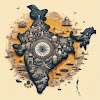What Makes Indian Civilization Considered the Oldest Among All Civilizations?
Indian civilization, often referred to as one of the cradles of human development, holds a unique place in the annals of history. Its roots stretch back thousands of years, making it one of the oldest continuously thriving civilizations in the world. The richness of its culture, the depth of its philosophy, and the resilience of its people have contributed to its enduring legacy. This article explores the factors that make Indian civilization stand out as one of the oldest and most influential civilizations in human history.
The Foundations of Indian Civilization
The origins of Indian civilization can be traced back to the Indus Valley Civilization, which flourished around 3300 BCE to 1300 BCE. This ancient civilization, also known as the Harappan Civilization, was remarkable for its advanced urban planning, sophisticated drainage systems, and thriving trade networks. The cities of Mohenjo-daro and Harappa are prime examples of the ingenuity and organizational skills of the people of this era.
What sets Indian civilization apart is its continuity. While many ancient civilizations, such as Mesopotamia and Egypt, experienced significant disruptions or declines, Indian civilization evolved and adapted over millennia. The transition from the Indus Valley Civilization to the Vedic Age (circa 1500 BCE) marked the beginning of a new chapter in Indian history, characterized by the composition of the Vedas, the foundational texts of Hindu philosophy.
Key Factors That Establish Indian Civilization as the Oldest
Continuous Inhabitation The Indian subcontinent has been continuously inhabited for tens of thousands of years. Archaeological evidence suggests that modern humans (Homo sapiens) arrived in the region around 65,000 years ago. This long history of human activity laid the groundwork for the development of complex societies and civilizations.
Ancient Urban Centers The Indus Valley Civilization is one of the earliest examples of urbanization in human history. Its well-planned cities, complete with granaries, warehouses, and marketplaces, reflect a high level of social and economic organization.
Rich Literary Tradition Indian civilization boasts one of the oldest literary traditions in the world. The Rigveda, composed around 1500 BCE, is among the earliest known texts. This tradition of preserving knowledge through oral and written means has ensured the survival of India's cultural and intellectual heritage.
Philosophical and Spiritual Depth Indian civilization is the birthplace of major religions, including Hinduism, Buddhism, Jainism, and Sikhism. These spiritual traditions have profoundly influenced not only India but also the rest of the world. Concepts such as dharma (duty), karma (action), and moksha (liberation) have their roots in ancient Indian philosophy.
Scientific and Technological Contributions Ancient India made significant advancements in science, mathematics, and medicine. The concept of zero, the decimal system, and texts like the Charaka Samhita and Sushruta Samhita highlight India's intellectual achievements.
Cultural Resilience and Adaptability Indian civilization has demonstrated remarkable resilience in the face of invasions, migrations, and colonization. Its ability to absorb and integrate diverse influences while maintaining its core identity has ensured its survival and growth.
Diverse and Inclusive Society The diversity of Indian civilization, encompassing various languages, religions, and cultural practices, has been a source of strength. This inclusivity has allowed Indian civilization to thrive and evolve over time.
The Global Impact of Indian Civilization
Indian civilization's contributions to the world are immense. From the spread of Buddhism across Asia to the global popularity of yoga and Ayurveda, India's cultural and intellectual heritage continues to inspire and influence people worldwide. The ancient trade routes, such as the Silk Road, facilitated the exchange of goods, ideas, and technologies, further cementing India's role as a global hub of civilization.
Conclusion
Indian civilization's status as one of the oldest in the world is a testament to its resilience, adaptability, and creativity. Its rich history, cultural diversity, and philosophical depth make it a beacon of human achievement. As we delve into the past, we gain a deeper appreciation for the enduring legacy of Indian civilization and its contributions to the world.






